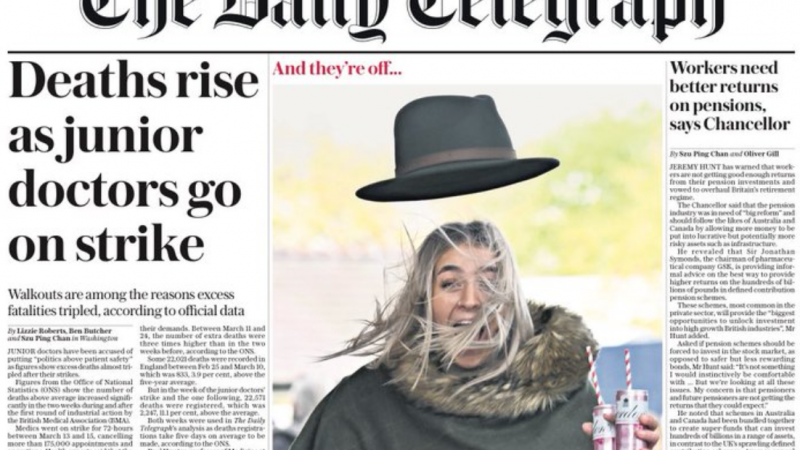“This is an intentional attempt to try and mislead the public," said the BMA

On April 14, the Telegraph’s front-page claimed that official data showed that the junior doctor’s strikes in March had contributed to a rise in the number of ‘excess deaths’ observed at the time. The article’s subheading read: “Walkouts are among the reasons excess fatalities tripled, according to official data.”
The British Medical Association (BMA), the trade union for doctors in the UK, immediately refuted the claim. Referring to the Telegraph’s article on Twitter, the BMA set the record straight. The union noted how the newspaper reported that during the doctor’s first round of action in England, the mortality rate was 11.1 percent above the five-year average. But as the BMA notes, what they didn’t report was that in Wales, where no strike action took place, the mortality rate was 14 percent above the five-year average.
The union continued that despite the Telegraph’s claims, their ‘innumerate use of data does not show an increase due to strike action.’ The BMA also points to how the report’s claim that the excess death rate in England had tripled compared to the two weeks before the strikes might be true, but in Wales it was the same – triple.
“This is an intentional attempt to try and mislead the public.
“Thanks to the efforts of our consultant and SAS colleagues to keep patients safe, there was no change in mortality trends during strike action,” said the BMA.
Both the Daily Mail and the Express made the same claims, with the Mail running with the headline: ‘Junior doctors accused of putting ‘politics above patient safety’ as strikes blamed for rise in deaths with new figures showing excess mortalities jumped by 11% amid first walkout.”
The Express meanwhile was blunter, with a headline reading: ‘Junior doctors accused of putting politics over patients as excess deaths rise.’
After some digging, the fact-finding team at Full Fact found that from the data available, it is not possible to say whether the strikes in England on March 13 – 15, had any effect on deaths at the time. Full Fact continued that although the number of excess deaths rose compared with the weeks before, it increased to a level that has often been seen in recent months. In England, the number of deaths also remained at a similar level in the fortnight after the strike period that the Telegraph considered.
Professor David Spiegelhalter, a statistician at Cambridge University, told Full Fact: “There are many possible explanations for the rise in excess deaths at this time, and no particular reason to attribute it to the doctors’ strike. Correlation does not imply causation.
“Compared to the long waiting lists and record A&E delays, I find it difficult to believe that a short strike could have such a large effect.”
The fact-finders’ verdict is that ‘official data shows a rise in excess deaths at this time, but this does not mean that strikes were necessarily a factor. A similar rise occurred at the same time in Wales, where there were no strikes.’ This conflicts with the Telegraph’s claim that official data shows that strikes are one of the reasons why excess deaths rose in England in March 2023.
Throughout the junior doctor’s strikes, the right-wing press didn’t hold back in attempting to whip up antagonism towards the BMA, labelling those behind the strikes as ‘hard left’ and ‘militant.’
Gabrielle Pickard-Whitehead is a contributing editor to Left Foot Forward
Left Foot Forward doesn't have the backing of big business or billionaires. We rely on the kind and generous support of ordinary people like you.
You can support hard-hitting journalism that holds the right to account, provides a forum for debate among progressives, and covers the stories the rest of the media ignore. Donate today.



